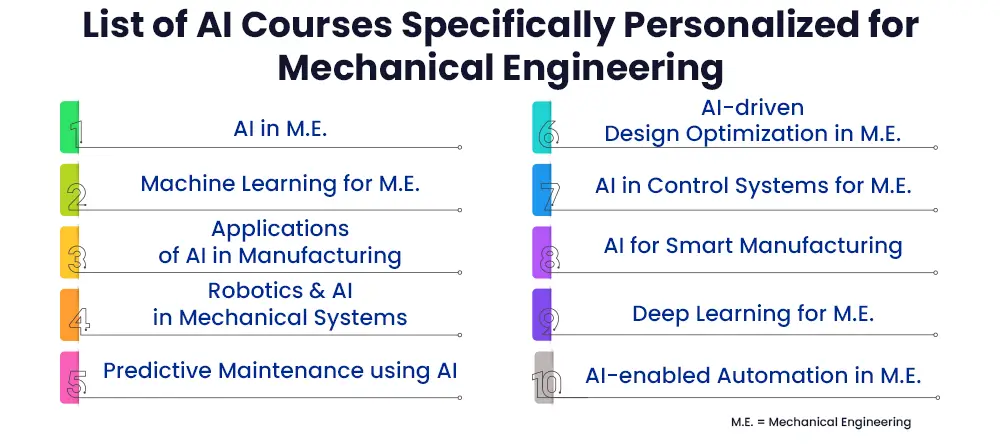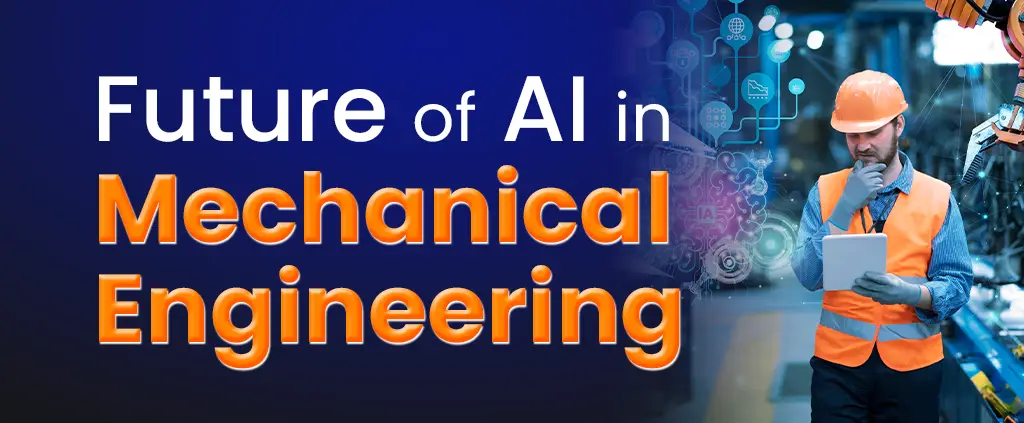Future of AI in Mechanical Engineering in India
AI in mechanical engineering has a bright future ahead of it, with the potential to completely transform the field on many fronts. The integration of AI is revolutionizing conventional industrial processes by maximizing accuracy, speed, and adaptability. Artificial Intelligence (AI) facilitates predictive maintenance using machine learning algorithms. This allows for the preemptive detection of possible machinery problems, which reduces downtime and improves overall equipment efficiency. Artificial intelligence (AI)-driven generative design algorithms help engineers create creative, optimized designs for products by taking into account a variety of limitations and characteristics, resulting in components that are stronger, lighter, and more efficient. Furthermore, AI-driven robots and automation are enhancing human skills, optimizing assembly lines and logistics, and guaranteeing safer and more flexible production settings. AI’s convergence with mechanical engineering will accelerate as it develops, leading to ground-breaking discoveries and changing the field of product and design methodologies.
Overview of AI in Mechanical Engineering in India [2024]
The industry has seen a paradigm change with the incorporation of AI technology, improving efficiency, accuracy, and creativity across a range of sectors. AI-driven predictive maintenance has become a key component that improves overall operational efficiency by allowing real-time equipment health monitoring, cutting downtime, and optimizing maintenance schedules. AI-powered design tools have also expedited the process of developing new products, enabling quicker simulation, optimization, and prototyping, which has resulted in the development of mechanical systems that are more reliable and economical. Furthermore, the application of AI-powered automation and robots has revolutionized production procedures, increasing output while maintaining accuracy and quality control. Advances in AI applications in Mechanical Engineering have been further accelerated by collaborations between academia, industry, and research organizations. This has created an atmosphere that is favorable for technical innovation and the development of skills in India’s engineering landscape.
Current Situation: By 2024, artificial intelligence will have become a major part of India’s mechanical engineering curriculum. The combination of artificial intelligence with mechanical engineering has the potential to completely transform design processes, production, and maintenance.
Applications: Artificial intelligence (AI) in mechanical engineering has several uses, including robots, automation, predictive maintenance, and design optimization. It helps to increase overall productivity, cut expenses, and streamline processes.
AI in Mechanical Engineering: PPT and PDF Resources
Artificial Intelligence (AI) in Mechanical Engineering is a cutting-edge combination of modern technology and established engineering methods that is transforming the field. These materials explain how artificial intelligence (AI) complements conventional mechanical engineering methods, enabling engineers to design smarter, more effective systems. To advance the area of mechanical engineering into a new era of innovation and efficiency, PPT and PDF materials are vital tools that promote better knowledge and expertise in harnessing AI.
- Mechanical engineering and artificial intelligence PPT: Talks about artificial intelligence (AI) in mechanical engineering provides a thorough overview of the field’s current developments, applications, difficulties, and opportunities. As teaching aids, these PowerPoints show real-world examples, useful applications, and prospective impact areas.
2. Mechanical Engineering and Artificial Intelligence PDF: PDF materials explore the application of AI in mechanical engineering in more detail. These comprise research papers, academic materials, industry reports, and scholarly articles that provide comprehensive insights into artificial intelligence (AI) applications and algorithms and how they are applied in the field of mechanical engineering.
AI in Mechanical Engineering Courses
By incorporating cutting-edge technology into the curriculum, artificial intelligence (AI) in Mechanical Engineering courses has revolutionized traditional pedagogy and improved the learning experience for students. This integration includes several aspects, such as theoretical knowledge, real-world applications, and field research projects, among others. Students obtain a deep understanding of complicated mechanical systems by utilizing AI to explore the fields of computational analysis, machine learning techniques, and predictive modeling. Students may replicate real-world situations using specialized software tools and simulations, which enables them to understand complex ideas like fluid dynamics, thermodynamics, and structural analysis with previously unheard-of precision and efficiency.

Additionally, AI helps future mechanical engineers solve problems more effectively by exposing them to intelligent systems that optimize designs, automate jobs, and support decision-making. This combination creates a more thorough and practical learning environment, giving students the knowledge and abilities necessary to tackle the modern problems that are common in the field of mechanical engineering. As a result, graduates have an advantage over others and are prepared to handle the rapidly changing industry 4.0 environment, where artificial intelligence and mechanical engineering techniques are seamlessly integrated.
AI in Mechanical Engineering Projects
AI is a catalyst in this field, improving manufacturing workflows, strengthening predictive maintenance, and streamlining design procedures. A key use case is design optimization, in which AI systems sift through enormous information to provide creative ideas that meet certain standards, allowing engineers to effectively consider a wide range of options. Artificial intelligence (AI) may improve quality control in manufacturing processes by using computer vision to identify flaws or abnormalities in real-time, assuring more accuracy and efficiency. By utilizing data-driven insights and intelligent automation, AI integration in Mechanical Engineering projects not only facilitates process optimization but also stimulates creativity.
The future of AI in mechanical engineering projects involves innovative applications and research initiatives.

AI Tools for Mechanical Engineering
AI technologies, which provide a wide range of applications that expedite design, analysis, and optimization processes, have completely changed the mechanical engineering scene. These technologies improve several aspects of mechanical engineering by utilizing neural networks, machine learning algorithms, and data analytics. Furthermore, AI-powered predictive maintenance systems estimate equipment failure by using sensor data and records, allowing for proactive actions that reduce downtime and improve operational effectiveness. Through predictive modeling and analysis, artificial intelligence (AI) also helps with waste reduction, material selection optimization, and automation of industrial processes. There is a vast range of software and programs available as AI tools for mechanical engineers.

Artificial Intelligence in Mechanical and Industrial Engineering PDF
They clarify how many processes in the fields of industrial and mechanical engineering may be improved and streamlined by integrating AI algorithms, machine learning models, and sophisticated data analytics approaches. These materials include topics such as predictive maintenance, which optimizes maintenance schedules and reduces downtime by using AI algorithms to analyze sensor data from equipment to anticipate possible problems. Furthermore, generative design algorithms, which optimize product designs by taking into account a variety of factors to provide effective and creative solutions, are another way that AI supports the design process. The application of robotics in manufacturing, where intelligent systems enable automation and improve precision and productivity on the assembly line, is also explained in PDFs on AI in mechanical and industrial engineering.
Overall, professionals and students can benefit greatly from the abundance of information found in PDF documents about artificial intelligence (AI) in mechanical and industrial engineering. These documents provide case studies, insights, and strategies for utilizing AI to drive innovation and advancement in these fields.
In conclusion, by 2024, artificial intelligence in mechanical engineering appears to have a bright future in India and other parts of the world. It opens doors to creativity, efficiency, and increased output in many areas of mechanical engineering and creates a world shaped by cutting-edge technology and intelligent systems.
Piping Question Answer Series Part – 03
Download Piping Question Answer series Part – 04
Read Also
Download Free Piping PDF for Interview Preparation
What is gasket and their types
What is a valve and its types?

